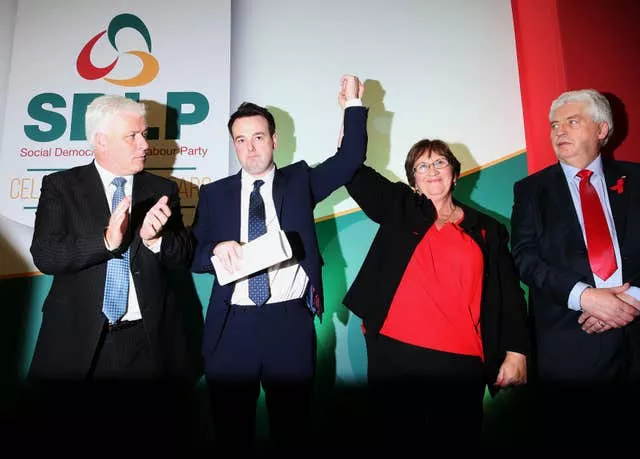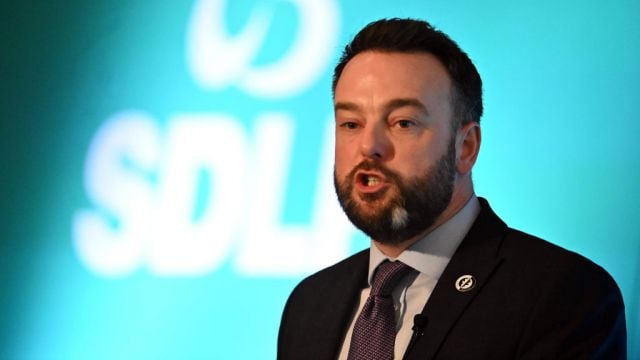When he launched his campaign to become leader of the SDLP in 2015, a young Colum Eastwood made his pitch to party members by telling them he was “fed up losing”.
Now the Foyle MP has stepped down almost a decade later, seemingly bruised by his inability to stop Sinn Féin from continually eating into the shrinking vote of the moderate nationalist party.
Mr Eastwood, 41, resigns as the second longest serving leader of his party. Only his political mentor and fellow Londonderry native John Hume was in charge for a longer period.
However, while Hume’s stature stands unchallenged as a political giant, Mr Eastwood will be remembered by many as an effective communicator and campaigner who ultimately failed to revive the fortunes of the party which once had been the dominant force in nationalism.

Born in Derry in 1983, Mr Eastwood was educated at St Columb’s College. He joined the SDLP when he was still a teenager and was elected to Derry City Council in 2022, later becoming the city’s youngest ever mayor. He was elected to the Northern Ireland Assembly in 2011.
When he became leader in 2015, after he challenged the incumbent Alasdair McDonnell, the SDLP had already suffered years of decline.
Worse was to follow in the 2017 general election, when under Mr Eastwood’s leadership, the party suffered a disastrous result in losing all three of its MPs.
However, he rebounded two years later in the 2019 general election when the party recaptured two seats, including Mr Eastwood regaining the Foyle seat in a stunning personal success with a huge majority of more than 17,000 ahead of Sinn Féin. The party held both seats in this year’s General Election.
However, it is at Stormont that the SDLP’s decline has been most keenly felt.
There was a bruising result in the 2022 Northern Ireland Assembly election with the party finishing with just eight seats, meaning it had to go into opposition. Sinn Féin, by contrast, emerged from that election with 27 seats, becoming the first nationalist party to claim the position of First Minister.

Mr Eastwood has mostly avoided controversy during his political career although he was criticised in 2012 when he carried the coffin of a personal friend at a paramilitary-style funeral before he was SDLP leader. Mr Eastwood said he had acted in a personal capacity and would do the same thing again.
Some of his most difficult moments as leader came following his announcement of a formal link with Fianna Fáil in 2019. While Mr Eastwood championed the partnership, it was criticised by some within his party.
Claire Hanna, the SDLP’s other big beast and who is tipped to succeed Mr Eastwood as leader, later revealed she had discussions about forming a new political party, such was her opposition to the Fianna Fáil deal.
The partnership between the two parties was later quietly dropped.
Last year Mr Eastwood was investigated by police after he took part in a walk to a court hearing with families of Bloody Sunday victims. The PSNI submitted a file to the Public Prosecution Service which said it was not in the public interest to charge the Foyle MP and a number of other people.
Mr Eastwood later said the police had apologised to him for the investigation.
During his time as leader, Mr Eastwood frequently excelled during public debates with rival parties and was often praised for his contributions at Westminster.
However, his inability to reverse the electoral decline of his SDLP, combined with accusations that he had failed to modernise party structures or resolve geographical rivalries continued throughout his years in charge.

Mr Eastwood maintained his talent for creating political headlines right to the end of his tenure. This year he refused to attend the White House St Patrick’s Day celebrations in Washington DC in protest at the US response to the Gaza-Israel war.
On being sworn in as an MP in July, Mr Eastwood described the oath of allegiance to the King as an “empty formula” which he said he took “under protest”.
Mr Eastwood has indicated he intends to remain as an MP and is expected to continue to contribute to the New Ireland commission he helped to establish to facilitate communications around Irish unity.
After holding its two Westminster seats this year, and with a three-year break ahead in the cycle of Northern Ireland elections, the SDLP’s youngest leader seems to have decided it is the right time for a change at the top.
Attention will quickly turn now to the search for his successor.







